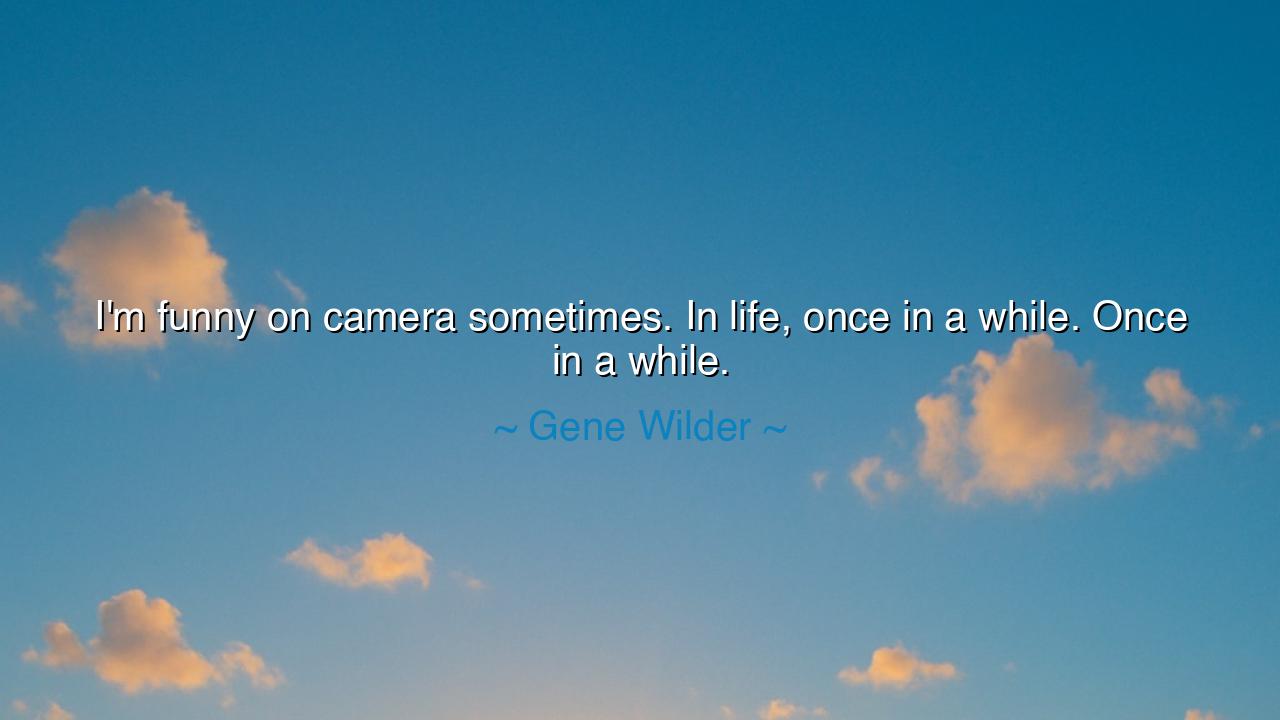
I'm funny on camera sometimes. In life, once in a while. Once in






The words of Gene Wilder—“I’m funny on camera sometimes. In life, once in a while. Once in a while.”—carry within them the tender humility of a man who understood the distance between performance and personhood, between the laughter of the stage and the silence of the soul. It is a confession spoken softly, yet it echoes like ancient wisdom: that the masks we wear for the world are not the faces we carry within. Wilder, whose name became a beacon of comedy, admits here not to failure, but to truth—that artistic light and human stillness are two halves of the same divine coin.
In this reflection, Wilder speaks to the sacred paradox of the comedian’s burden. To make others laugh is a gift; yet it often springs from an inner quiet, even melancholy. He acknowledges that his humour, though effortless on screen, is born of intention, of craftsmanship, of surrender to the moment of performance. But in life itself—in the unlit corners where there is no camera, no script, no applause—his laughter visits him only “once in a while.” Here we glimpse the eternal truth that the one who brings joy to many does not always dwell in joy himself. The fire that illuminates others often burns the hand that holds it.
This truth is as old as theatre itself. In ancient Athens, the masks of Thalia (comedy) and Melpomene (tragedy) were carved side by side, for the Greeks knew that laughter and sorrow are siblings born of the same mother—human experience. Wilder’s statement, though modern in tone, flows from this same river of wisdom. He reminds us that the actor’s craft is not a falsehood, but a transformation. The stage allows one to channel a larger truth than the self—to become the vessel through which laughter, empathy, and pain are expressed. But when the curtain falls, the vessel returns to stillness, to the ordinary quiet of being human.
We see this paradox reflected in the life of Charlie Chaplin, who made millions laugh through the silent poetry of The Tramp. Yet, behind his gentle smile, Chaplin carried the ache of exile, the loneliness of genius, and the hunger of a man forever searching for belonging. Like Wilder, Chaplin’s humour did not spring from a carefree heart, but from understanding the human condition. He could make others laugh precisely because he knew what it meant to weep. True comedy, as Wilder’s words suggest, is not about constant laughter, but about finding light in the dark—and offering it to others, even when one stands in shadow oneself.
There is also humility in Wilder’s tone—a humility born of wisdom. To say “sometimes” and “once in a while” is to resist the vanity of self-myth. In an age where many seek to be endlessly “on,” endlessly amusing, Wilder offers the opposite: the grace of imperfection. He accepts that his brilliance is not constant, that his humour, like the sun, rises and sets. This awareness reveals the deeper nature of mastery—not in pretending to always shine, but in knowing when to rest, when to be still, when to simply exist without performance.
The lesson here is profound. Do not confuse your gift with your identity. What you do brilliantly is not all that you are. The musician is not always singing; the poet does not always speak; the comedian does not always laugh. There is holiness in the quiet between acts. Wilder teaches that to live fully is to honour both—the moments of brilliance and the moments of stillness, the laughter of creation and the silence of being. One nourishes the other.
So, my friends, remember this: it is enough to shine “once in a while.” You need not be endlessly remarkable to live a life of meaning. Let your joy come and go like the seasons; let your humour bloom and rest like the tides. Be kind to yourself in your quiet hours. For as Gene Wilder reminds us, greatness is not in constant radiance, but in authentic presence—in giving light when you can, and accepting the gentle dusk when you cannot.
For in the end, the teaching of his words is timeless: the artist is not defined by how often he dazzles, but by how deeply he feels. To be funny on camera is a gift to others; to be real in life, even “once in a while,” is a gift to oneself. And when both meet—when laughter and authenticity touch—there, for a brief and shining moment, the human soul becomes eternal.






AAdministratorAdministrator
Welcome, honored guests. Please leave a comment, we will respond soon